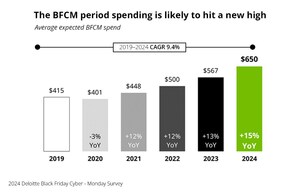Deloitte Poll: Decade After USA PATRIOT Act, Fight Against Money Laundering and Corruption Continues
Increase in Compliance Costs Remains a Concern
NEW YORK, Oct. 5, 2011 /PRNewswire/ -- Ten years after the USA PATRIOT Act (Patriot Act) became law, one-quarter (25.9 percent) of business professionals polled during a recent Deloitte webcast think regulators in the United States will focus most heavily on money laundering, terrorist financing and other Patriot Act-related areas over the next five years. Additionally, poll participants believe regulators will focus most heavily on fraud and corruption schemes such as insider trading and financial fraud (35.4 percent), and bribery and corruption measures in the Foreign Corrupt Practices Act and UK Bribery Act (13.8 percent).
"Since 9/11, the discourse and enforcement activity around money laundering, corruption and fraud has changed," said Michael Zeldin, global anti-money laundering practice leader for Deloitte. "What was once a law enforcement effort to curtail drug trafficking has expanded into a national security imperative in which corporate America has an important role to play."
Respondents also indicate the most likely impetuses for the next regulatory changes on corporate fraud, anti-money laundering and corruption would be highly publicized business fraud cases (35.2 percent) and a continued global economic crisis (34 percent).
"A consequence of the economic downturn is reduced funding and resources for corporate compliance," said David Williams, chief executive officer, Deloitte Financial Advisory Services LLP. "While I don't think there are a lot of CEOs and board members out there saying 'let's try to get away with fewer compliance efforts,' many companies now have compliance risk management programs that are likely not commensurate with their organizational exposures. It's a risky game to play as the global economy continues to struggle."
Higher corporate compliance costs (47.4 percent) and increased director and officer liability (29.6 percent) are among the most significant changes resulting from anti-fraud, anti-money laundering or corruption legislation passed during the last decade.
"Countries outside of the U.S. have increased their efforts to crackdown on money laundering, terrorist financing, corruption and related frauds, a byproduct of which is increased sanctions against both organizations and individuals," added Zeldin. "Compliance programs found to be lacking have led to increased civil fines and criminal penalties. Even board members have been fined personally for failure to adequately oversee implementation of regulatory remediation orders."
More than 1,340 business professionals from the consumer and industrial products; financial services; technology, media and telecommunications; defense and other industries responded to the polling questions during the webcast, "Global Fraud and Corruption: A Decade of Change."
As used in this document, "Deloitte" means Deloitte LLP and its subsidiaries. Please see www.deloitte.com/us/about for a detailed description of the legal structure of Deloitte LLP and its subsidiaries. Certain services may not be available to attest clients under the rules and regulations of public accounting.
Shelley Pfaendler |
Liz Cheek |
|
Public Relations Deloitte |
Hill & Knowlton +1 212 885 0682 |
|
+1 212 492 4484 |
||
SOURCE Deloitte
WANT YOUR COMPANY'S NEWS FEATURED ON PRNEWSWIRE.COM?
Newsrooms &
Influencers
Digital Media
Outlets
Journalists
Opted In




Share this article